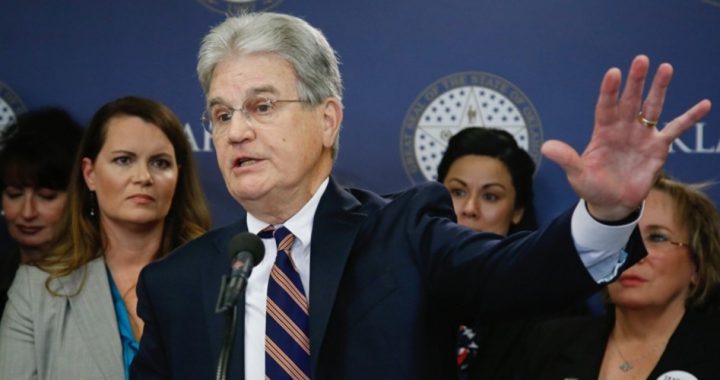
{modulepos disable_comments}
Former U.S. Senator Tom Coburn (R-Okla.) spoke to the House Federal and State Affairs Committee of the Kansas House of Representatives on Wednesday as part of his multi-state tour to persuade enough states to petition Congress to hold a National Convention to consider amendments — changes — to the United States Constitution.
But Coburn insists that he is not wanting to change the Constitution via what he calls a Convention of the States: “We’re about restoring the Constitution — not changing it…. Opposition to this is fear — not courage. Unless you have your head in the sand, you know we’re in trouble.”
Coburn had a strongly conservative voting record while serving six years in the U.S. House of Representatives, followed by 10 years in the U.S. Senate (he quit during a second term, in 2014, citing undisclosed health reasons). An exception to that mostly conservative record was his vote in 2008 to bail out the big banks during the financial meltdown.
Since leaving the Senate, Coburn has been paid hundreds of thousands of dollars to lobby for the calling of a National Convention to consider amendments to the Constitution, as specified in Article V of the Constitution. Under Article V, amendments may be proposed by two-thirds vote of each house of Congress, or by a National Convention called by Congress at the request of two-thirds of the several states. Either method also requires ratification by three-fourths of the state legislatures, or three-fourths of the state conventions.
No such convention has ever been held, and James Madison, whose contributions to the Constitution were so great that he is often referred to as “the father of the Constitution,” expressed fear for the nation’s survival if a second such convention was held.
Apparently, Coburn would relegate Madison to those who have their heads “in the sand.” Why would Madison and modern opponents oppose a convention of the states to consider amendments? Michael Leachman, who is with the Center on Budget and Policy Priorities, said the risks involved with a convention would outweigh any potential benefit. He warned that it could put changes into the Constitution that are “radical and harmful.”
Leachman added, “Taking this unprecedented step would put the nation’s Constitution up for grabs, putting at risk the cherished rights and freedoms the Constitution enshrines and widening the already great political divisions we see in this country today.”
Similar sentiments were expressed by Mark Desetti, a Kansas education lobbyist, who considered a Constitutional Convention dangerous. “A Constitutional Convention would devolve into a battle of left versus right. It would throw our country into great turmoil, a period of extraordinary tension and deep anxiety, and likely find itself quickly mired in momentous, lengthy legal and political battles.”
While convention advocates argue that each state would be equally represented at any such convention, the Constitution does not specify how delegates would be chosen, or how many votes each state would have. That may have been the intention of Madison and others, but we do not know. But the clear wording of Article V is that it is Congress that actually calls the convention, upon the application of two-thirds of the states. One could reasonably argue that the high-population states would insist upon more delegates than lower-population states. Whether Congress would dictate the rules of the Convention or whether the delegates themselves would do so is also unclear.
Coburn told the Kansas legislators that he would like to see amendments proposed at any such convention of the states for term limits on members of Congress, restraint of executive power, and forcing a new era of fiscal responsibility through an amendment to the Constitution requiring a balanced federal budget. Exactly how term limits would improve anything is also not clear. After all, the same electorate that has elected our present Congress would elect replacements. For that matter, the same electorate that made Nancy Pelosi Speaker of the House would be selecting the delegates to a convention.
Some convention advocates protest that the state legislatures would choose the delegates, but again, the Constitution simply does not say how the delegates must be chosen.
It is certainly curious that Coburn could say that he is not wanting to change the Constitution, when he has traveled all over America asking for a Constitutional Convention to propose changes to the Constitution. Term limits, for example, would most definitely be a change to the Constitution. The delegates at the original Constitutional Convention considered term limits and specifically rejected them. Other changes besides Coburn’s could also be considered at any such Constitutional Convention. Liberal delegates could be expected to offer amendments gutting the Second Amendment and abolishing the Electoral College. For that matter, the entire Constitution could theoretically be scrapped.
As the late Justice Antonin Scalia once remarked, the 21st century is just a bad century in which to write a Constitution.
John Axtell, a resident of Wichita, Kansas, and a volunteer coordinator with the Kansas Campaign for Liberty, offered similar sentiments: “Stronger, clearer, more abundant or just different words will not have any impact on this problem. Not one iota. We need leaders. People who will be honest about what it takes to rein in out-of-control government and secure freedom and prosperity.”
The problem is that no branch of the U.S. government is following the present Constitution. Giving them another amendment that they likely won’t follow will not solve the problem. The solution is to be found not in Article V, but in Article VI, which states that all officeholders are to follow the U.S. Constitution. Until the electorate forces them to do that, additional language in the Constitution will not do the job.
As early American congressman John Randolph (a cousin of Thomas Jefferson) once said, the Constitution is just parchment — just words on a piece of paper — unless the American people themselves force their elected officials to follow it.
Photo: AP Images





